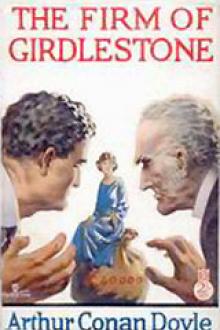The Firm of Girdlestone - Arthur Conan Doyle (free ebook novel .TXT) 📗

- Author: Arthur Conan Doyle
- Performer: -
Book online «The Firm of Girdlestone - Arthur Conan Doyle (free ebook novel .TXT) 📗». Author Arthur Conan Doyle
"Come, it's not so very bad after all," the merchant muttered, after he had gone over these figures very slowly and carefully. He leaned back in his chair and looked up at the ceiling with a much more cheerful expression upon his face. "At the worst it is less than thirty thousand pounds. Why, many firms would think little of it. The fact is, that I have so long been accustomed to big balances on the right side that it seems to be a very dreadful thing now that it lies the other way. A dozen things may happen to set all right. I must not forget, however," he continued, with a darker look, "that I have dipped into my credit so freely that I could not borrow any more without exciting suspicion and having the whole swarm down on us. After all, our hopes lie in the diamonds. Ezra cannot fail. He must succeed. Who can prevent him?"
"Major Tobias Clutterbuck," cried the sharp, creaky voice of Gilray as if in answer to the question, and the little clerk, who had knocked once or twice unnoticed, opened the door and ushered in the old Campaigner.
[1] It may be well to remark, that this and succeeding incidents occurred in the old Crown Colony days, before the diamond legislation was as strict as it has since become.
CHAPTER XVIII. MAJOR TOBIAS CLUTTERBUCK COMES IN FOR A THOUSAND POUNDS.John Girdlestone had frequently heard his son speak of the major in the days when they had been intimate, and had always attributed some of the young man's more obvious vices to the effects of this ungodly companionship. He had also heard from Ezra a mangled version of the interview and quarrel in the private room of Nelson's Restaurant. Hence, as may be imagined, his feelings towards his visitor were far from friendly, and he greeted him as he entered with the coldest of possible bows. The major, however, was by no means abashed by this chilling reception, but stumped forward with beaming face and his pudgy hand outstretched, so that the other had no alternative but to shake it, which he did very gingerly and reluctantly.
"And how are ye?" said the major, stepping back a pace or two, and inspecting the merchant as though he were examining his points with the intention of purchasing him. "Many's the time I've heard talk of ye. It's a real treat to see ye. How are ye?" Pouncing upon the other's unresponsive hand, he wrung it again with effusion.
"I am indebted to Providence for fairly good health, sir," John
Girdlestone answered coldly. "May I request you to take a seat?"
"That was what me friend Fagan was trying to do for twelve years, and ruined himself over it in the ind. He put up at Murphytown in the Conservative interest, and the divil a vote did he get, except one, and that was a blind man who signed the wrong paper be mistake, Ha! ha!" The major laughed boisterously at his own anecdote, and mopped his forehead with his handkerchief.
The two men, as they stood opposite each other, were a strange contrast, the one tall, grave, white, and emotionless, the other noisy and pompous, with protuberant military chest and rubicund features. They had one common characteristic, however. From under the shaggy eyebrows of the merchant and the sparse light-coloured lashes of the major there came the same keen, restless, shifting glance. Both were crafty, and each was keenly on his guard against the other.
"I have heard of you from my son," the merchant said, motioning his visitor to a chair. "You were, I believe, in the habit of meeting together for the purpose of playing cards, billiards, and other such games, which I by no means countenance myself, but to which my son is unhappily somewhat addicted."
"You don't play yourself," said the major, in a sympathetic voice. "Ged, sir, it's never too late to begin, and many a man has put in a very comfortable old age On billiards and whist. Now, if ye feel inclined to make a start, I'll give ye seventy-five points in a hundred for a commincement."
"Thank you," said the merchant drily. "It is not one of my ambitions.
Was this challenge the business upon which you came?"
The old soldier laughed until his merriment startled the clerks in the counting-house. "Be jabers!" he said, In a wheezy voice, "d'ye think I came five miles to do that? No, sir, I wanted to talk to you about your son."
"My son!"
"Yes, your son. He's a smart lad—very smart indeed—about as quick as they make 'em. He may be a trifle coarse at times, but that's the spirit of the age, me dear sir. Me friend Tuffleton, of the Blues, says that delicacy went out of fashion with hair powder and beauty patches. he's a demned satirical fellow is Tuffleton. Don't know him, eh?"
"No, sir, I don't," Girdlestone said angrily; "nor have I any desire to make his acquaintance. Let us proceed to business for my time is valuable."
The major looked at him with an amiable smile. "That quick temper runs in the family," he said. "I've noticed It in your son Ezra. As I said before, he's a smart lad; but me friend, he's shockingly rash and extremely indiscrate. Ye musk speak to him about it."
"What do you mean sir?" asked the merchant, white with anger.
"Have you come to insult him in his absence?"
"Absence?" said the soldier, still smiling blandly over his stock. "That's the very point I wanted to get at. He is away in Africa—at the diamond fields. A wonderful interprise, conducted with remarkable energy, but also with remarkable rashness, sir—yes, bedad, inexcusable rashness."
Old Girdlestone took up his heavy ebony ruler and played with it nervously. He had an overpowering desire to hurl it at the head of his companion.
"What would ye say, now," the veteran continued, crossing one leg over the other and arguing the matter out in a confidential undertone— "what would you say if a young man came to you, and, on the assumption that you were a dishonest blackgaird, appealed to you to help him in a very shady sort of a scheme? It would argue indiscretion on his part, would it not?"
The merchant sat still, but grew whiter and whiter.
"And if on the top of that he gave you all the details of his schame, without even waiting to see if you favoured it or not, he would be more than indiscrate, wouldn't he? Your own good sinse, me dear sir, will tell you that he would be culpably foolish—culpably so, bedad!"
"Well, sir?" said the old man, in a hoarse voice.
"Well," continued the major, "I have no doubt that your son told you of the interesting little conversation that we had together. He was good enough to promise that if I went to Russia and pretinded to discover a fictitious mine, I should be liberally rewarded by the firm. I was under the necessity of pointing out to him that certain principles on which me family"—here the major inflated his chest—"on which me family are accustomed to act would prevint me from taking advantage of his offer. He then, I am sorry to say, lost his temper, and some words passed between us, the result of which was that we parted so rapidly that, be jabers! I had hardly time to make him realize how great an indiscretion he had committed."
The merchant still sat perfectly still, tapping the table with his black ebony ruler.
"Of course, afther hearing a skitch of the plan," continued the major, "me curiosity was so aroused that I could not help following the details with intherest. I saw the gintleman who departed for Russia— Langworthy, I believe, was his name. Ged! I knew a chap of that name in the Marines who used to drink raw brandy and cayenne pepper before breakfast every morning. Did ye? Of course you couldn't. What was I talking of at all at all?"
Girdlestone stared gloomily at his visitor. The latter took a pinch of snuff from a tortoise-shell box, and flicked away a few wandering grains which settled upon the front of his coat.
"Yes," he went on, I saw Langworthy off to Russia. Then I saw your son start for Africa. He's an interprising lad, and sure to do well there. coelum non animam mutant, as we used to say at Clongowes. He'll always come to the front, wherever he is, as long as he avoids little slips like this one we're spaking of. About the same time I heard that Girdlestone & Co, had raised riddy money to the extint of five and thirty thousand pounds. That's gone to Africa, too, I presume. It's a lot o' money to invist in such a game, and it might be safe if you were the only people that knew about it, but whin there are others—"
"Others?"
"Why, me, of course," said the major. "I know about it, and more be token I am not in the swim with you. Sure, I could go this very evening to the diamond merchants about town and give them a tip about the coming fall in prices that would rather astonish 'em."





Comments (0)